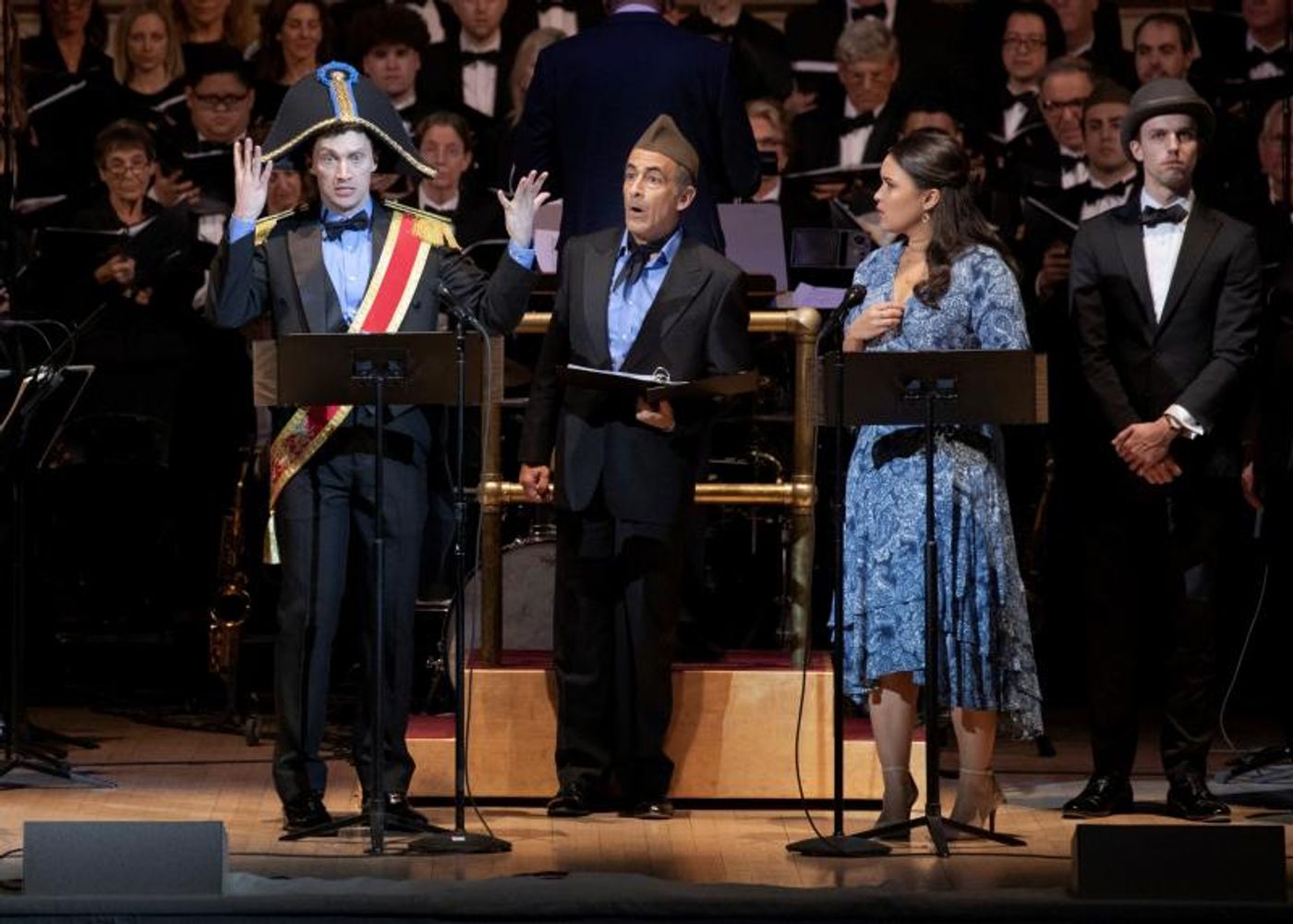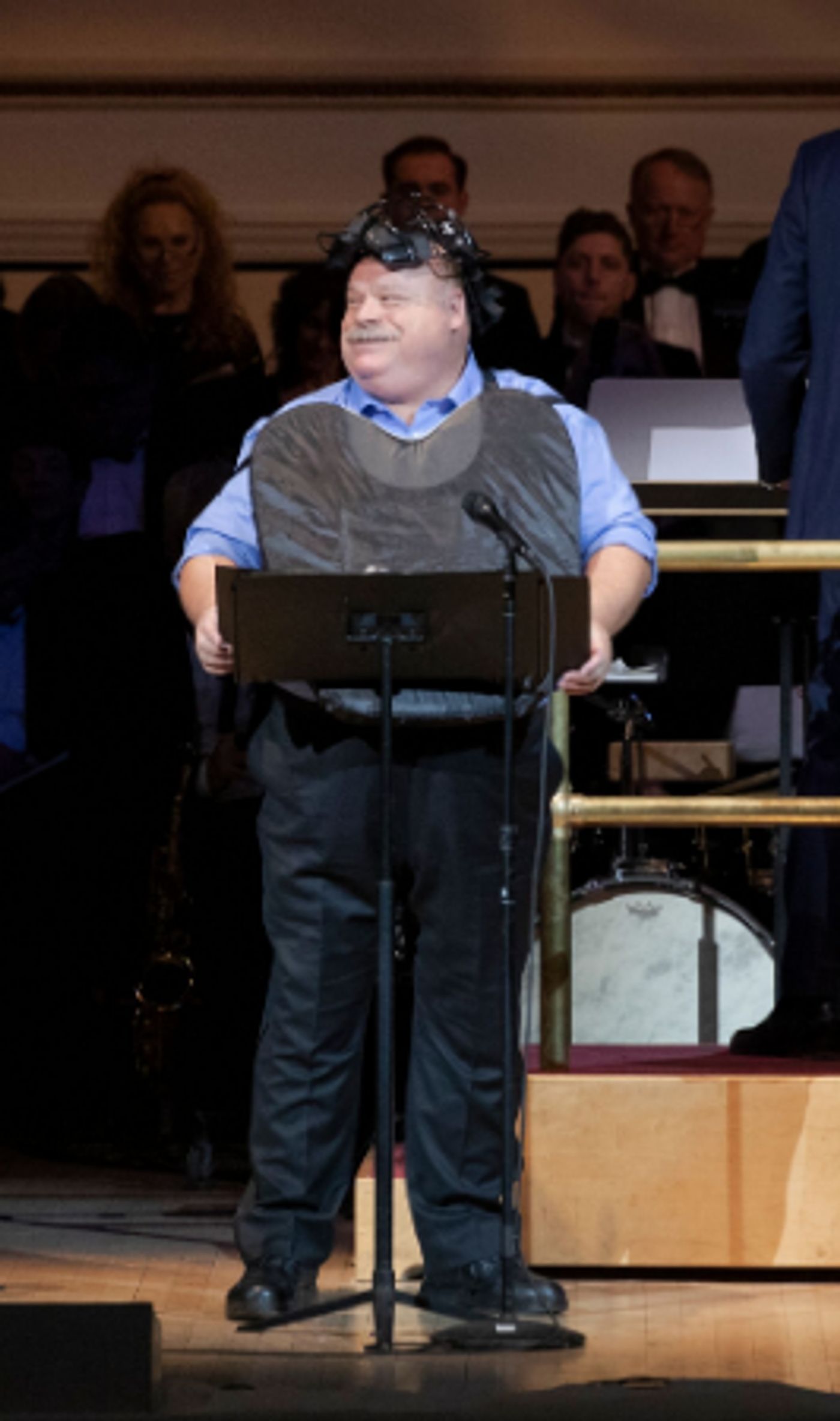Review: Bryce Pinkham Overthrows The Government as MasterVoices Presents Gershwin Satire LET 'EM EAT CAKE
"I've got a little favor to ask of you," an American president asks the members of the Supreme Court on the night he's lost his re-election bid.
There are probably few around who can vouch for how audiences reacted to that line when LET 'EM EAT CAKE, the sequel to the Pulitzer Prize winning musical OF THEE I SING, hit Broadway in 1933, but in 2019, at MasterVoices' sublimely sung and divinely played concert production, the Carnegie Hall crowd gave the gag a big round of applause.

(Photo: Erin Baiano)
The last of the three political satire jazz operettas created by George and Ira Gershwin and bookwriters George S. Kaufman and Morrie Ryskind during the early years of that decade, LET 'EM EAT CAKE depicts how the deposed John P. Wintergreen, who won the presidency in OF THEE I SING by promising that, if elected president, he will marry his sweetheart, Mary Turner, gets the backing of America's military and stages a revolution of the proletariat to have himself installed as the country's first dictator.
Music critics raved over LET 'EM EAT CAKE, praising George Gershwin's compositions, a minor key conglomerate of whimsy and bluesy complexity, as among the most sophisticated examples of Broadway theatre music to date. The composer regarded the score as his "claim to legitimacy."
Notices from Broadway's drama critics were mixed, finding OF THEE I SING's charming, romantic tone being replaced by the anarchy of darkly humored silliness that featured moments like the Supreme Court being put in chains as punishment for not voiding an election and comical attempts to fix a defective guillotine while the vice-president's neck is in position.
And no doubt some may have been put off by the plot point of imitating Nazi Germany's brown shirts and Fascist Italy's black shirts with Wintergreen's blue shirts.
Little was heard of LET 'EM EAT CAKE after its 90-performance run, although its ballad "Mine" evolved into a semi-standard, even being interpolated into a 1952 revival of OF THEE I SING.
But when a filed and forgotten copy of the composer's notes were discovered in the Library of Congress, a reconstruction effort by vocal arranger John McGlinn and orchestrator Russell Warner resulted in a completed version based on Edward Powell's originals, which premiered in 1987 under the baton of Michael Tilson Thomas at the Brooklyn Academy Of Music.
Since the original Broadway production boasted a cast of 90 and a full-sized orchestra, the artists performing under the baton of MasterVoices' artistic director Ted Sperling probably came close to replicating the sounds that filled Broadway's Music Box Theatre during the autumn and early winter of '33.
The Orchestra of St. Luke's' playing of the overture alone, with its clashing themes and softer passages building to the climactic march of the musical's title song ("Let 'em eat cake! / The land of freedom is free once more!") was enough to earn a cheering ovation. The excitement of the evening increased even more when the large MasterVoices chorus, stationed upstage for the concert, let loose with the conflicting melodies of the musical's opening sequence; a revised version of OF THEE I SING's "Wintergreen For President" ("Give the man a second chance, / He has given us romance.") competing for attention with the minor key praises for his opponent, John P. Tweedledee.

(Photo: Erin Baiano)
The original stars of OF THEE I SING, William Gaxton, Victor Moore and Lois Moran, repeated their Broadway roles in LET 'EM EAT CAKE, and MasterVoices retained two out of three from their OF THEE I SING concert of two years ago. Bryce Pinkham once again lent his brand of adorably noble nerdiness to Wintergreen, coming off as a cross between Groucho and Napoleon as he corkscrew danced across the stage in celebration of his new authoritarian power.
Kevin Chamberlin also returned as the sweetly oblivious Vice President Alexander Throttlebottom, who nearly sends the country into bankruptcy with a controversial call when he umpires a baseball game between the Supreme Court and The League of Nations. (Don't ask... it's complicated.)
Added to the mix was crystalline-voiced soprano Mikaela Bennett as Mary, the woman who pretty much stays in the background until she saves the day at the end of each act. Her handling of faux-dramatic solos was thrilling to hear and she was especially fun in a giddy number where Mary convinces the financially struggling women of America to support her husband's rebellion for the opportunity to become members of the country's second DAR.
David Pittu sang with good old fashioned New York moxie as Kruger, the professional rabble-rouser who helps Wintergreen overthrow the government and then, in keeping with his credo "Down with everything that's up," tries to overthrow Wintergreen.
Seasoned character men Fred Applegate, Chuck Cooper and Louis J. Stadlen were great fun as Wintergreen's corrupt cronies, as was Bill Buell as the corruptible military leader.
The crazy plot was held together with commentary by Christopher Fitzgerald, who abandoned his narrator's position briefly to impishly portray the overthrown Tweedledee.
As is normally the case with concert productions, Laurence Maslon's adaptation trimmed the script a bit. Musical theatre aficionados will notice the removal of a comic scene involving the elderly, long-bearded members of the Union League, as well as the omission of party girl Trixie and the revision of an Ira Gershwin lyric referencing Othello that would be less appreciated today than it was in 1933.
American politics has always been the source of great satire, but great satire, due to its topicality, rarely ages well. Has LET 'EM EAT CAKE found new relevance with the administration of a president who has strongly hinted that he might not go away quietly if ousted? LET 'EM EAT CAKE is on the schedule for this summer's season at Ohio Light Opera. Let's see if more productions crop up.
Reader Reviews
Videos

